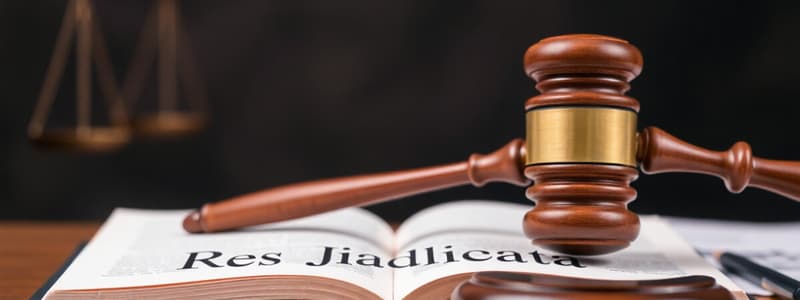Podcast
Questions and Answers
Which type of judgment or order is appealable under Rule 41?
Which type of judgment or order is appealable under Rule 41?
- Final judgments affecting substantial rights (correct)
- Advisory opinions from lower courts
- Interim orders during ongoing cases
- Preliminary orders
What is the maximum time period to file an appeal after being notified of the judgment?
What is the maximum time period to file an appeal after being notified of the judgment?
- 15 days (correct)
- 20 days
- 30 days
- 10 days
What happens to the execution of the judgment while an appeal is pending?
What happens to the execution of the judgment while an appeal is pending?
- Execution continues unless withdrawn
- It stays unless the court directs otherwise (correct)
- The execution is suspended for 30 days
- It is immediately executed
What must an appellant do to initiate the appeal process?
What must an appellant do to initiate the appeal process?
Under Rule 41, what may lead to the dismissal of an appeal?
Under Rule 41, what may lead to the dismissal of an appeal?
What is required from the clerk of court after an appeal is perfected?
What is required from the clerk of court after an appeal is perfected?
What effect does the withdrawal of an appeal have on the previous judgment?
What effect does the withdrawal of an appeal have on the previous judgment?
Which of the following modes of appeal is NOT mentioned as permissible in the provisions of Rule 41?
Which of the following modes of appeal is NOT mentioned as permissible in the provisions of Rule 41?
What is the main focus of cases elevated to the Supreme Court?
What is the main focus of cases elevated to the Supreme Court?
What effect do pro forma motions for a new trial have on the appeal period?
What effect do pro forma motions for a new trial have on the appeal period?
Which of the following dates must be indicated in the record on appeal according to the Material Data Rule?
Which of the following dates must be indicated in the record on appeal according to the Material Data Rule?
What is the rationale behind the rule on separability of appeals?
What is the rationale behind the rule on separability of appeals?
What might happen if essential dates are not provided in the record on appeal?
What might happen if essential dates are not provided in the record on appeal?
Under Rule 42, what is the process for filing a petition for review?
Under Rule 42, what is the process for filing a petition for review?
Why is the Supreme Court's role focused on interpreting law rather than factual findings?
Why is the Supreme Court's role focused on interpreting law rather than factual findings?
Which best describes a pro forma motion?
Which best describes a pro forma motion?
What factors can lead to the dismissal of an appeal under Rule 50?
What factors can lead to the dismissal of an appeal under Rule 50?
What does the liberal interpretation of the 'material data rule' under Rule 50 allow?
What does the liberal interpretation of the 'material data rule' under Rule 50 allow?
Which of the following scenarios can render a case moot under Rule 50?
Which of the following scenarios can render a case moot under Rule 50?
Under which rules are frivolous appeals typically addressed?
Under which rules are frivolous appeals typically addressed?
What characterizes a frivolous appeal?
What characterizes a frivolous appeal?
What discretionary power does the appellate court have regarding the dismissal of appeals?
What discretionary power does the appellate court have regarding the dismissal of appeals?
What is required under the 'material data rule' in the context of appeals?
What is required under the 'material data rule' in the context of appeals?
Which of the following statements is true regarding appellate decisions?
Which of the following statements is true regarding appellate decisions?
What must the appellee's brief contain?
What must the appellee's brief contain?
What is the consequence of failing to file briefs within the prescribed period?
What is the consequence of failing to file briefs within the prescribed period?
What is the primary focus of the reply brief?
What is the primary focus of the reply brief?
How long does the CA have to render a decision after a case is submitted?
How long does the CA have to render a decision after a case is submitted?
Which principle emphasizes flexibility in applying procedural rules?
Which principle emphasizes flexibility in applying procedural rules?
In the context of appeals, what does it mean that the appellee cannot obtain affirmative relief?
In the context of appeals, what does it mean that the appellee cannot obtain affirmative relief?
What does the filing and service of briefs entail?
What does the filing and service of briefs entail?
What action may the CA take if procedural requirements are not met?
What action may the CA take if procedural requirements are not met?
What authority does the Appellate Court have regarding frivolous appeals?
What authority does the Appellate Court have regarding frivolous appeals?
At what stage can the legality of allowing a late appeal be challenged?
At what stage can the legality of allowing a late appeal be challenged?
What is a key distinguishing factor between an ordinary appeal and a petition for review?
What is a key distinguishing factor between an ordinary appeal and a petition for review?
What does it mean for an issue raised on appeal to involve a pure question of law?
What does it mean for an issue raised on appeal to involve a pure question of law?
What happens if a frivolous appeal is identified by the Appellate Court?
What happens if a frivolous appeal is identified by the Appellate Court?
Which procedural step is necessary for an ordinary appeal from an RTC decision?
Which procedural step is necessary for an ordinary appeal from an RTC decision?
Which of the following statements is true regarding the jurisdiction of the Appellate Court?
Which of the following statements is true regarding the jurisdiction of the Appellate Court?
What does 'de novo' review indicate about the appellate court's role?
What does 'de novo' review indicate about the appellate court's role?
Flashcards are hidden until you start studying
Study Notes
Principles of Res Judicata
- Conclusive and binding judgments prevent relitigation of the same issues between the same parties.
- This principle upholds the finality of decisions and the integrity of the judicial process.
Rule 41: Appeal from Regional Trial Courts
- Governs appeals from Regional Trial Court (RTC) decisions to the Court of Appeals (CA) or Supreme Court (SC).
- Appeals are restricted to final judgments or orders affecting substantial rights.
- Key procedural modes for appealing: ordinary appeal, petition for review, and appeal by certiorari.
- The appeal period is limited to 15 days from notice of the judgment.
- Notice of appeal must be filed with the original court that issued the decision.
- The record on appeal is due within 30 days from the judgment notice if required.
- Filing an appeal incurs a docket and other necessary fees.
- The clerk of court is obligated to transmit records to appellate courts within 15 days post-appeal perfection.
- The appeal process is perfected upon filing the notice and payment of dues.
- Generally, an appeal stays the execution of the contested judgment unless stated otherwise by the court.
- Appeals may be dismissed for non-compliance with procedural necessities, and appellants can withdraw their appeal prior to record transmittance.
- Withdrawal of an appeal results in reinstating the original decision.
Material Data Rule
- Essential dates must be clearly indicated in the record on appeal to verify compliance with timelines.
- These dates include filing of complaints, answers, trials, and decisions, ensuring the appeal is timely filed.
- Non-compliance can lead to dismissal of the appeal.
Rationale for Separability of Appeals
- Allows distinct appeals for separate legal issues to enhance judicial efficiency and minimize delays.
- Encourages the timely resolution of critical legal questions without waiting for entire case conclusions.
Rule 42: Petition for Review from Regional Trial Courts to the Court of Appeals
- Establishes procedures for RTC decisions review by CA under appellate jurisdiction.
- Requires detailed content in briefs, including subject indexes and counter-statements of facts.
- Timely filing of briefs is crucial; non-filing can lead to appeal dismissal.
- The CA has the authority to set hearings or render decisions based solely on submitted briefs.
- Decisions must be issued within 90 days from case submission.
Liberal Application of Procedural Rules
- Emphasizes flexibility in procedural adherence to prioritize justice and fairness over technicalities.
- Courts encouraged to consider substantive rights of parties when interpreting rules.
Appellee Rights and Dismissal Authority
- Appellees cannot seek additional affirmative relief in appeals.
- Appellate courts have discretionary power to dismiss appeals based on failure to comply, but can choose not to dismiss to serve justice.
Frivolous Appeals
- Appeals deemed frivolous lack legal merit and do not present reasonable arguments for modification or reversal.
- Appellate courts can impose sanctions on frivolous appeals to prevent misuse of the judicial process.
Jurisdictional Issues with Late Appeals
- The timeliness of an appeal is a jurisdictional concern impacting court authority.
- Legal challenges to the granting of late appeals can arise at any stage of proceedings.
Modes of Appealing RTC Decisions
- Ordinary appeals for RTC original jurisdiction are filed with the CA, requiring notice submission.
- Petition for review is used for RTC appellate jurisdiction, filed directly with the CA.
Pure Questions of Law
- Appeals involving purely legal questions focus on correct application or interpretation of laws, disregarding factual disputes.
- Such appeals usually undergo de novo review, with no deference to trial court conclusions.
Studying That Suits You
Use AI to generate personalized quizzes and flashcards to suit your learning preferences.




